Key takeaways
- Female singer photography focuses on capturing both appearance and emotional depth, fostering a personal connection with fans.
- While filters can enhance visual appeal, they risk distorting authenticity and can set unrealistic beauty standards.
- Lizzo’s photography showcases bold colors and empowerment, balancing artistry with genuine self-expression.
- Unfiltered images resonate more with audiences, promoting self-acceptance over idealized perfection.

Overview of female singer photography
In female singer photography, the art lies in capturing not just the appearance but the essence of the artist. I’ve always felt that a powerful image of a female musician can convey her personality, struggles, and triumphs. For instance, when I look at portraits of artists like Lizzo, I see a blend of confidence and vulnerability that resonates deeply with fans, making them feel connected to her story.
Filters can sometimes distort that reality, altering the raw emotion that a photograph can express. While they can enhance visual appeal, I often wonder if they take away from the authenticity that these artists represent. As someone who appreciates genuine representation in photography, I prefer images that reflect the unfiltered charisma of the artist.
- Captures both visual beauty and emotional depth.
- Highlights individuality and unique storytelling.
- Balances artistic expression with authenticity.
- Engages fans on a more personal level, fostering connection.
- Risks creating unrealistic standards or perceptions.
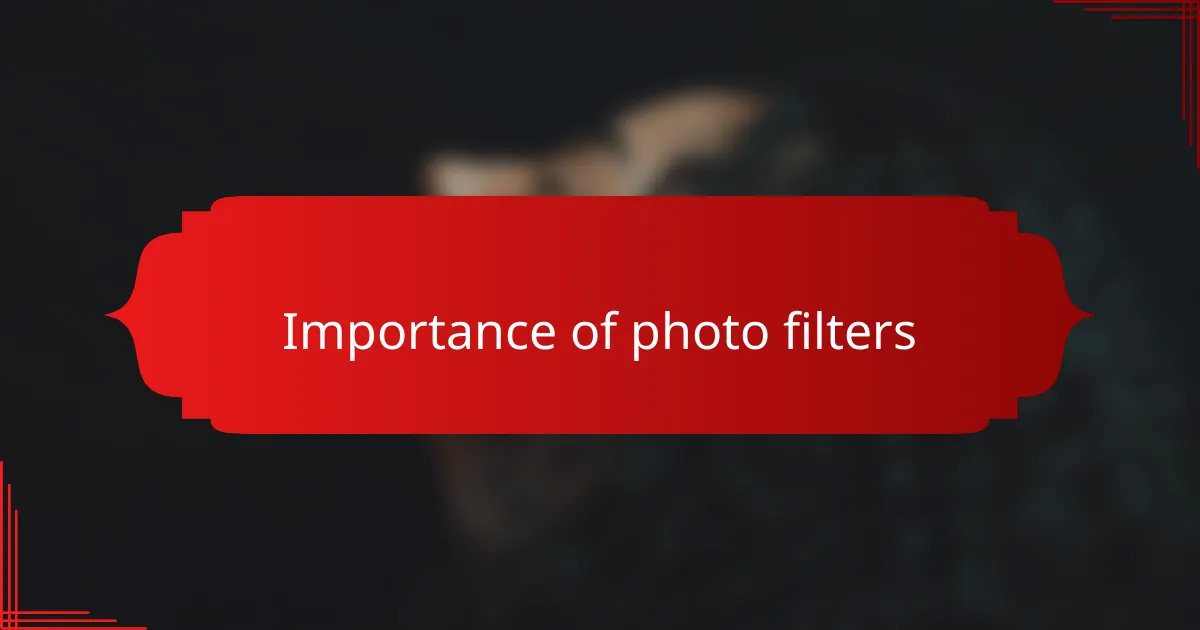
Importance of photo filters
Filters play a vital role in photography, especially when it comes to enhancing the mood of a photo. I’ve noticed that the right filter can bring out the warmth in a singer’s smile or highlight the texture of their clothing, creating a compelling visual narrative. For instance, when I see a photo of Lizzo, a carefully chosen filter might accentuate her vibrant personality and artistry, making me feel more connected to her energy.
However, I sometimes question whether filters might unintentionally set unrealistic beauty standards. There have been moments when I’ve come across images of artists that look so polished they lose their essence. It makes me think—are we celebrating individuality, or are we pushing everyone to conform to a certain ideal? Authenticity is crucial, and I believe that unfiltered moments often strike a more profound chord with fans.
Ultimately, filters should serve to complement, not overshadow, the artist’s true self. The balance between enhancing an image and preserving its raw emotional depth is delicate. I personally lean towards images that embrace imperfection because they allow us to appreciate the real stories behind the music, forging a deeper connection with the artist.
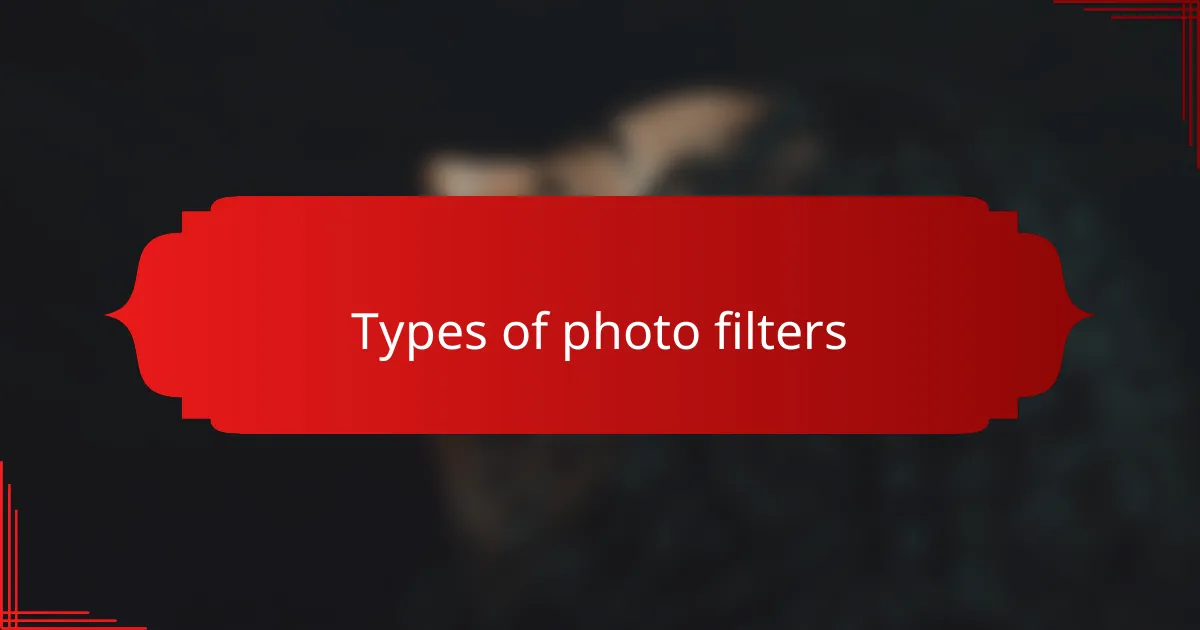
Types of photo filters
When it comes to photo filters, there is a wide variety to choose from, each offering a unique flair. Personally, I find that filters can enhance a photograph by adjusting brightness, contrast, and color saturation, making the subject pop in a vibrant way. For example, I’ve experimented with different filters on my photos, and it’s intriguing how a simple change can evoke distinct feelings about the image.
Here’s a quick overview of some popular types of photo filters:
- Enhancement Filters: Boosts colors and contrast for a more vivid look.
- Black and White Filters: Adds a classic feel and focuses on composition.
- Vintage Filters: Creates an aged effect, often evoking nostalgia.
- Soft Focus Filters: Blurs sharp edges, giving a dreamy appearance.
- High Dynamic Range (HDR) Filters: Combines multiple exposures for stunning detail in highlights and shadows.
As a photography enthusiast, I appreciate how these filters can tell different stories, sometimes even shifting the viewer’s emotional response entirely.

Analyzing Lizzo’s photography style
Lizzo’s photography style is vibrant and reflects her unapologetic personality. When I look at her images, I feel a mix of joy and empowerment. She often opts for bold colors and expressive poses, which really captures her essence as an artist and a performer. Personally, I admire how she uses photography to celebrate her body and individuality, turning the lens into a tool of self-affirmation rather than mere aesthetic enhancement.
The contrast between her raw, authentic self and the filters she sometimes applies can create an interesting dialogue about beauty standards. While I appreciate the artistry that comes with photo editing, I often wonder if it takes away from the genuine vibe she naturally exudes. Selecting the right balance can be challenging, but for Lizzo, her confidence shines through, regardless of the filters.
| Aspect | Lizzo’s Approach |
|---|---|
| Color Palette | Vibrant and Bold |
| Emotion Conveyed | Joy and Empowerment |
| Use of Filters | Artistic, but may obscure authenticity |
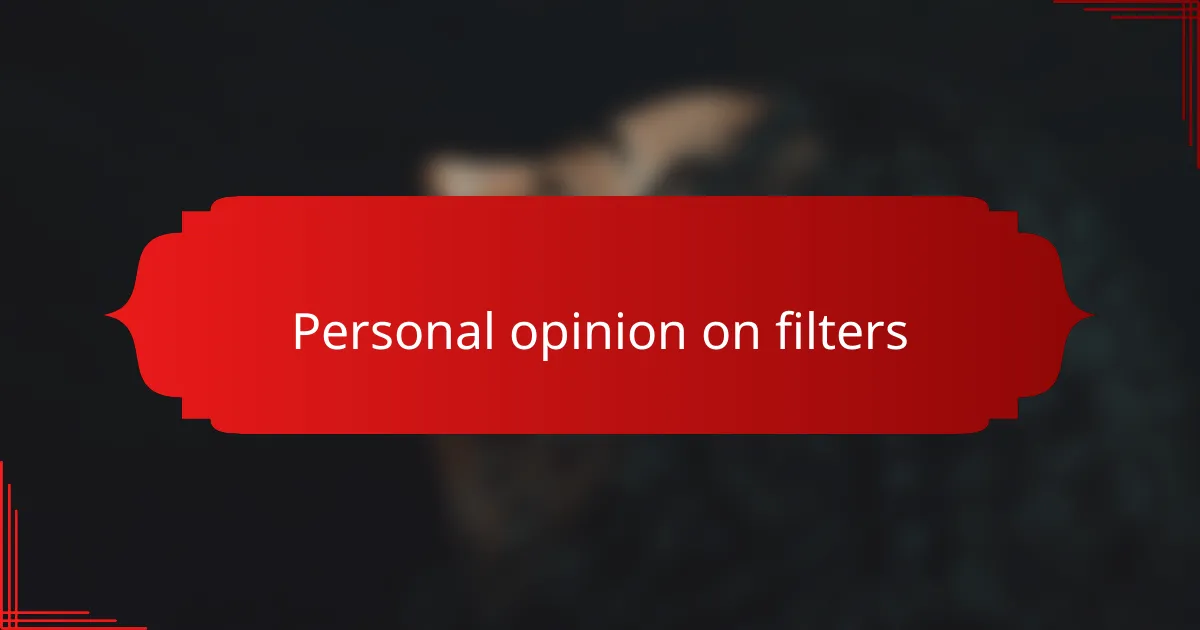
Personal opinion on filters
Applying filters to images in photography is a fascinating topic. On one hand, they can create stunning visuals that draw the viewer in, but I often wonder about the impact they have on our perception of artists. I remember the first time I saw a filter-heavy photo of Lizzo; while I appreciated the aesthetic, I couldn’t help but feel it masked the genuine energy she exudes.
Filtered images can sometimes blur the line between reality and idealized beauty. I’ve experienced this myself when curating my own photos; after using a filter, I found myself questioning whether the final image was truly representative of me. There’s a certain beauty in imperfections, don’t you agree? Oftentimes, it’s those flaws that tell the real story of who we are, much like Lizzo’s own journey in embracing her individuality.
Ultimately, I believe filters should enhance rather than diminish the authenticity of an artist’s essence. It’s like seasoning in cooking—the right amount can elevate the dish, but too much can overpower it. My preference leans toward unfiltered moments; they resonate more deeply and allow us to connect with the artist on a more personal level. When I see Lizzo in her natural state, there’s an undeniable authenticity that draws me in far more than any filter ever could.
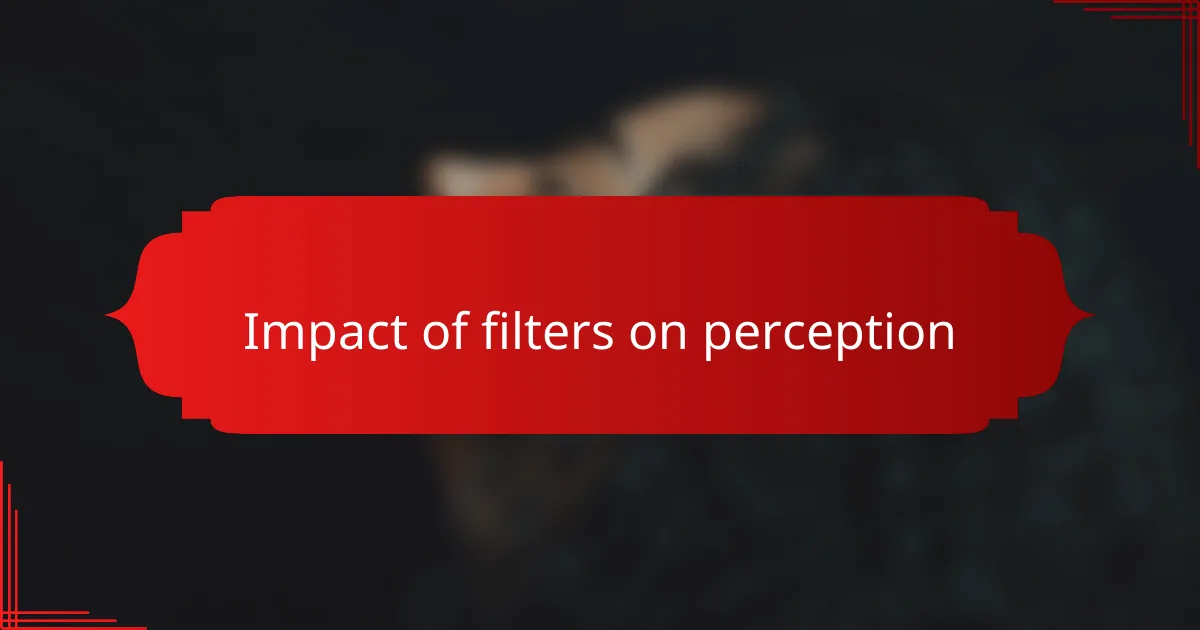
Impact of filters on perception
Applying filters to images can significantly shape our perception of artists like Lizzo. I’ve noticed that while a filter can enhance an image’s aesthetic appeal, it can also create a distorted reality that veers away from the true essence of the subject. When I scroll through social media, I sometimes find myself asking, “Is this the real Lizzo, or just an idealized version?” This question lingers in my mind as I ponder the fine line between art and authenticity.
Filters can certainly highlight certain features or moods, but I’ve experienced moments when they overshadow the raw emotion that makes a photograph powerful. For instance, I once saw a striking image of Lizzo with a colorful filter that transformed her appearance. While it was visually stunning, it seemed to mask the genuine spark of authenticity that I love about her. It left me yearning for the unfiltered Lizzo—the one whose confidence shines brightly without the layers of digital enhancement.
I think it’s essential to consider how filters affect not only our view of artists but also our own self-image. Reflecting on my own experiences, I’ve felt pressure to conform to polished standards set by filtered images. There’s a certain relief in embracing imperfection, both in photography and in life. I believe that moments captured without filters often tell a more profound story—one that can resonate more deeply with fans, creating a connection that is genuine and lasting.
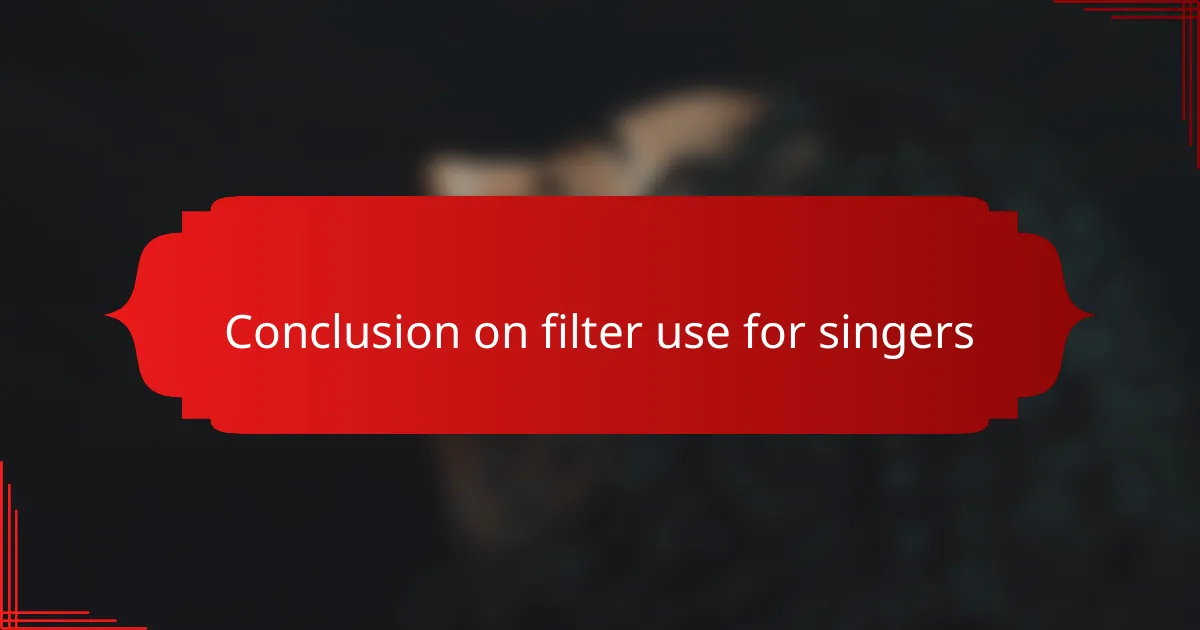
Conclusion on filter use for singers
Applying filters to photos has become a common practice among singers, including the likes of Lizzo. While filters can enhance images, it’s essential to consider the message they send about authenticity and self-acceptance. Personally, I believe that while a little enhancement can be fun, it’s crucial for artists to balance it with their true selves, as this fosters genuine connections with fans.
In my experience, I’ve seen how unfiltered images resonate deeply with audiences. Fans appreciate authenticity; it’s relatable and human. When singers show their natural beauty, it sends a powerful message that self-love transcends societal standards of perfection.
| Aspect | Filtered Photos | Unfiltered Photos |
|---|---|---|
| Impact on Authenticity | Can diminish perceived authenticity | Enhances relatability and connection |
| Fan Engagement | May attract initial attention | Fosters deeper emotional bonds |
| Message to Fans | Perfect image ideals | Emphasizes self-acceptance |


